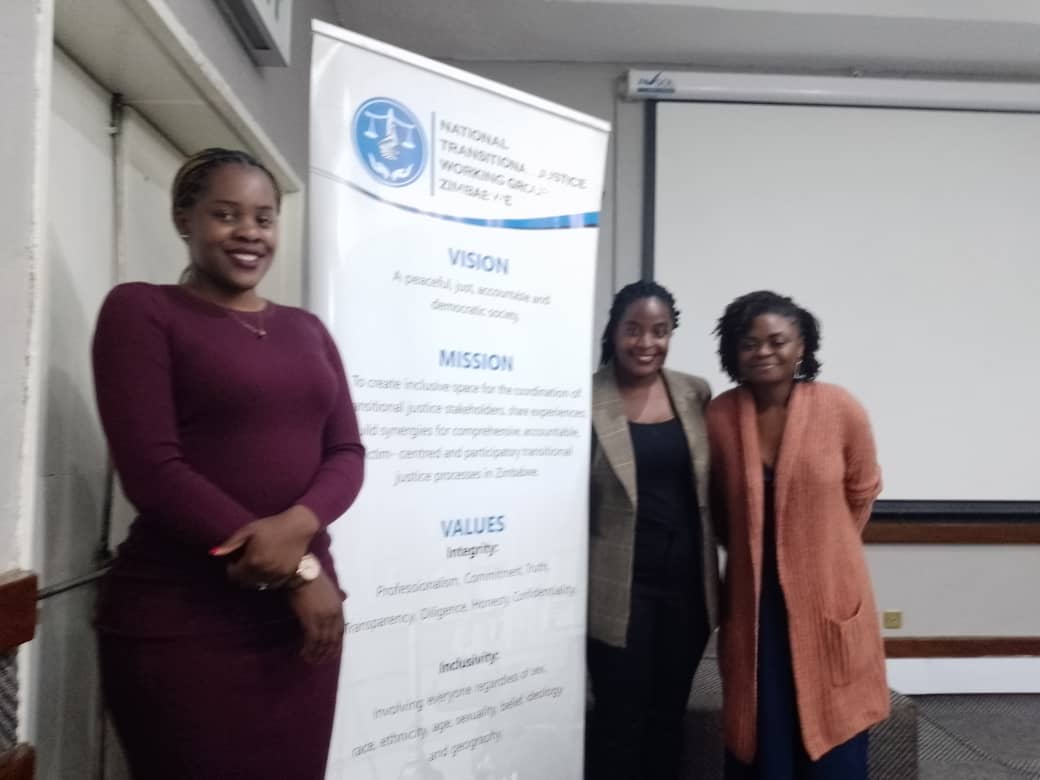|
Getting your Trinity Audio player ready…
|
The National Transitional Justice Working Group (NTJWG) has underscored the major role that the media plays in facilitating engagement with the broad national audience to promote peace and shape the discourse around transitional justice.
This emerged today at a seminar in Harare that focused on the role of the media in transitional justice with media practitioners drawn from all the major conventional and online media houses on 9 June 2022.
“The objective of the meeting is to build transitional justice knowledge in the broader public and among stakeholders through the use of media,” said Fortune Kuhudzehwe, the Coordinator of the National Transitional Justice Working Group.
In her presentation, the Media Institute of Southern Africa (MISA) Zimbabwe Legal and ICT Policy Officer, Nompilo Simanje alluded to Section 61 of the Constitution on media freedom and freedom of expression that gives media practitioners the right to seek, receive and impart information.
“In the case of promoting transitional justice, the media plays a key role in facilitating access to information by the public. The citizens have a clear right to receive fair, unbiased, and divergent views as espoused in Section 62 of the Constitution.
“As a lawyer let me allude to the case of Firine Trust and Ors vs ZBC and Ors. It’s clear from this case study that journalism is one of the oldest and noblest professions with a rich body of rules and ethics. The media by the powers vested in them through law and social contract have the capacity to make or break a nation. Media can foster democracy or stifle it. Journalists should guard against skewed reporting that leads to polarity and threatens national peace,” Simanje said.
She said the media should at all times uphold ethical and professional standards.
“In dealing with these issues, the media should report fairly completely and accurately. They should at all times be impartial, and afford fair opportunity for the presentation of divergent views and dissenting opinions. Inaccuracies should be rectified without delay and with due prominence, The media should not promote violence or hatred against any class of persons.
In writing stories or articles that relate to sensitive matters, Simanje said it is important to choose diction that promotes peace, unity, and inclusion.
“Avoid language that encourages racial, ethnic, or religious prejudice or hatred; or encourages or incites violence, or is likely to lead to undue public contempt towards any class of person in Zimbabwe. Avoid opinion pieces including guest writers that disgorge hate and inflammatory language.
“When interviewing survivors or ‘victims’, avoid interview questions that increase or cause more trauma. The media should consider the harm survivors may experience if a story is published, especially if their identity is revealed. Journalists should have a clear justification for their publishing decision in the context of the conflict, and after considering fully the risk it might pose to igniting further violence. Carefully identify and select your sources. Information verification is key. Find the human angle in your stories,” Simanje added.
The media was encouraged to acquire knowledge and be in touch with key stakeholders promoting transitional justice in the country as well as to monitor and report on the work of key stakeholders.
“It’s important to file information requests in terms of the Freedom of Information Act where the stakeholders are not reporting on certain issues. Civil society has a role to also focus on training Media practitioners on conflict reporting towards transitional justice,” it was recommended.
Transitional justice endeavours have been very diverse in Zimbabwe. State institutions, as well as civil society organisations, have been implementing trailblazing activities to further the objectives of transitional justice, particularly after the formation of the National Peace and Reconciliation Commission (NPRC). However, as reflected by various transitional justice stakeholders at the 2018 Transitional Justice Symposium convened by the National Transitional Justice Working Group (NTJWG), transitional justice will not be achieved in Zimbabwe until it becomes a social movement. During the 2020 NTJWG Annual Retreat for Strategic Reflection, the NTJWG took stock of how far it had gone in contributing to making transitional justice a social movement in Zimbabwe and noted that transitional justice remained largely an elitist movement. In this sense, the NTJWG is concerned about the noticeable absence of public and private media strategies to better inform the public.
Inasmuch as the NTJWG and other transitional justice stakeholders have made several interventions and scored various impressive successes, these remain underreported by media outlets. Whilst the ability to achieve tangible results is important, efforts to inform the nation in ways that suit the different audiences provide opportunities and space for the public to influence initiatives. Given the central role that the media plays in keeping citizens informed and shaping public opinion, it is fundamental that the media actively participate in informing the public of those endeavours promoted by the NTJWG and other transitional justice stakeholders.
